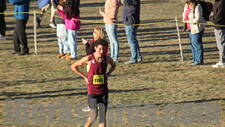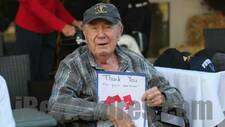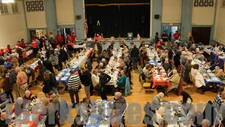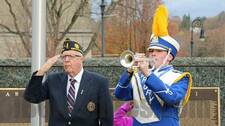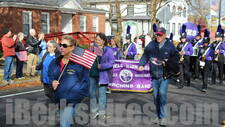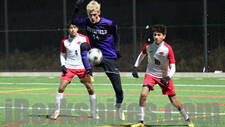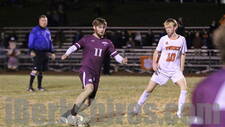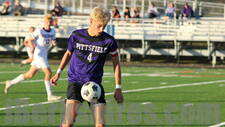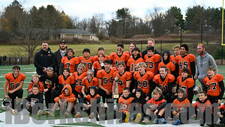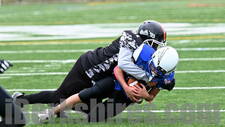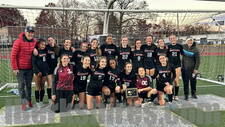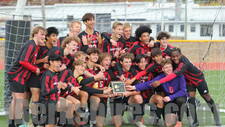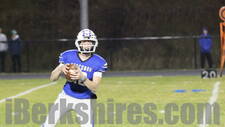Cancer: Long Journey Over Rough RoadBy Susan Bush
03:01PM / Thursday, May 03, 2007
 | | Brianna Trudeau was four-years-old when she walked a Northern Berkshire Relay For Life Survivor's lap in 2006 [Photo 2006, Sue Bush] |
Over the next few weeks, Relay for Life events will step off in the Northern Berkshire and Central/South Berkshire region as well as Bennington, Vt..
Cancer survivors and those undergoing cancer treatment and their caregivers, their family, friends, and relay team mates take turns walking a track, every pace marking another stride toward cancer cures. As the saying goes, "a journey of a thousand miles begins with a first step."
The relay fundraisers have been very successful regionally. Thousands of dollars were raised during 2006 regional relay events.
There is one phrase that has never been uttered after a local Relay For Life: "No one shed a tear."
Fighting cancer is nothing short of a physically demanding war. Battles are big and small, with some the result of treatment, others the result of illness, but all fierce internal struggles with very high stakes. There are victories.
And sometimes, there are not.
Treatments can rob people of their hair, their vitality, and their dignity. Eating may become a chore.
A great resource for those facing cancer treatments is offered by the U.S. Department of Health and Human Services, the National Institutes of Health and the National Cancer Institute. The 60-page booklet is packed with information and was made available free at the April 30 REACH Community Foundation's "Girls Night Out" at the North Adams Regional Hospital.
Included within the pages are these tips:
Preparations
For those scheduled to begin treatments, stock your home with foods that are enjoyed, and remember to include foods that have been appealing during times of illness such as the flu. Stock up on items that may be enjoyed with little or no preparation, such as peanut butter, tuna fish, cheese or eggs. Cook some meals in advance and freeze meal-sized portions for future dining. Speak with a registered dietician about any concerns. A dietician may be able to help organize a shopping list with foods that might ease side effects such as nausea or diarrhea.
The Journey
Once treatments are underway, pay attention to times of day when appetite may be stronger. It is important to know that there are people who do experience any adverse symptoms from treatment, and others who experience mild to moderate symptoms. During times when appetite is poor or nausea is an issue, the booklet suggests trying one or two foods or relying on a liquid meal replacement.
"On those days when you can't eat at all, don't worry about it," according to the information. "Do what you can to make yourself feel better. Come back to eating as soon as you can and let your doctor know if this problem doesn't get better within a couple of days. Try drinking plenty of fluids on those days when you don't feel like eating."
Those who experience sore mouths or gums may want to try eating soft foods such as yogurt, oatmeal, bananas, applesauce, and macaroni and cheese or drink milkshakes. Pureed vegetables and meats may be an option as well. Foods described as "easy on the stomach" include sherbet, angel food cake, toast, crackers, and canned peaches or other soft fruits.
"If nausea occurs during radiation therapy or chemotherapy, avoid eating for 1 to 2 hours before treatment," according to the booklet information.
If diarrhea is a problem, try to include foods that contain sodium and potassium. Bananas, boiled or mashed potatoes, cream of wheat, and yogurt are examples of foods that may help those affected by diarrhea.
How To get The Booklet
The booklet includes an easy-to-read glossary of terms that most cancer patients will hear, and also offers several pages of recipes and tips about coping with the strong emotions a cancer diagnosis and treatment might generate. There are suggestions for caregivers as well.
This booklet may be acquired by visiting a www.cancer.gov Internet website and selecting a "NCI Publications" icon. Next, select a "Coping With Cancer" icon. Booklet titles are presented in the English and Spanish languages, with the booklet list showing titles in Spanish first. Select the title "Eating Hints for Cancer Patients before During And After Treatment." The booklets are distributed by the NCI at no charge unless 20 or more items are ordered. If an order exceeds 20 items, an $8 minimum shipping and handling charge is required.
Booklets may also be ordered by calling 1-800-422-6237.
|



